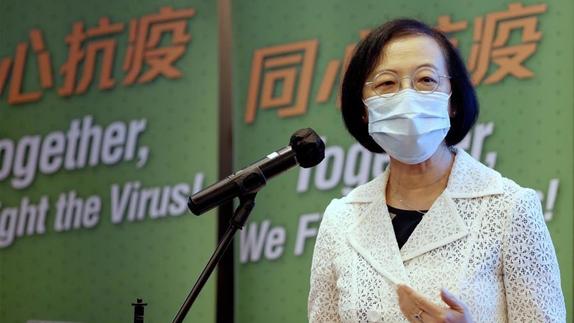 Sophia Chan Siu-chee, secretary for food and health of the Hong Kong Special Administrative Region government, addresses a ceremony to welcome the arrival of the mainland nucleic acid testing team at Metropark Hotel Kowloon in Hong Kong, south China, Sept 3, 2020. (PHOTO / XINHUA)
Sophia Chan Siu-chee, secretary for food and health of the Hong Kong Special Administrative Region government, addresses a ceremony to welcome the arrival of the mainland nucleic acid testing team at Metropark Hotel Kowloon in Hong Kong, south China, Sept 3, 2020. (PHOTO / XINHUA)
HONG KONG - Hong Kong will give a one-time HK$5,000 (US$645) payment to anyone in the city who tests positive for COVID-19 to encourage people to get themselves tested as the financial hub reported 68 new confirmed coronavirus cases on Sunday.
Health Secretary Sophia Chan Siu-chee said the Labour and Welfare Bureau will announce details of the handout plan, according to local media reports. She also said the Hong Kong Special Administrative Region (HKSAR) government is setting up another five community testing centers, adding to the four already in operation.
Hong Kong will impose new social restrictions as local coronavirus cases spike, prompting an announcement Saturday that a planned travel bubble between Hong Kong and Singapore would be postponed for two weeks
ALSO READ: Live pub performance banned as HK sees most cases in 3 months
“Virus testing is a very important strategy, especially when we are now facing a very severe situation in Hong Kong. The number of unlinked cases has been increasing in the past few days and we are now testing more people,” Chan said in a media interview.
Hong Kong will impose new social restrictions as local coronavirus cases spike, prompting an announcement Saturday that a planned travel bubble between Hong Kong and Singapore would be postponed for two weeks.
Of the 68 new COVID-19 cases on Sunday, 61 were local infections while seven were imported cases, said Chuang Shuk-kwan, head of the communicable disease branch of the Centre for Health Protection.
There were 12 local cases of unknown origin while 46 were related to the cluster involving 14 dance venues in Wan Chai, Causeway Bay, Sheung Wan, Tseng Kwan O, San Po Kong, Mong Kok, Sham Shui Po, Tsim Sha Tsui, and Norht Point.
"At present, the cases related to the dance clusters amount to 80 cases. Some of them are family members, friends, or people who had meals with those in the dance cluster," Chuang said.
Hong Kong issued its first compulsory testing order Sunday, requiring people who been on the premises of any of the 14 dance centers this month to be screened. The businesses will be shut for five days through Nov 26, according to a government statement.
ALSO READ: Hong Kong, Singapore delay planned travel bubble for 2 weeks
"In the dance cluster, one is a cleaner...together with another cleaner from another dancing club, it shows there maybe environment contamination at these premises," Chuang said.
The cluster shows the “existence of many silent transmission chains in the community,” a spokesman for the Food and Health Bureau was quoted as saying.
Chuang also said that one of the cases linked to the dance centers cluster involved a teacher who last had a face-to-face class with about 20 students on Nov 20.
On the other hand, the 12 local infections of unknown origin included that of a 70-year-old woman who performed in a Chinese opera at Leighton Hill Community Hall in Wan Chai. She and another performer were not wearing face masks but there was some distance between them and the audience of about 20 people all had their masks on, Chuang said.
Another case of unknown origin involved a 17-year-old primary school student in Tai Po. Classes at the students' school were suspended and the other students tested, Chuang added.
She also said that the seven imported cases involved cabin crew members from India, Mexico, Turkey, and Russia and one traveler from Pakistan.
According to the Hospital Authority, there were 164 COVID-19 patients being treated at 19 hospital on Sunday, including eight in critical condition and two in serious condition.
READ MORE: Legislators call for strict measures to contain pandemic
With inputs from Bloomberg


